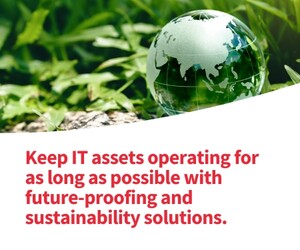Sustainability is no longer a luxury for retailers — it’s a strategic necessity. Key business stakeholders such as customers, regulators and investors understand that sustainability is critical to business resilience and success. Increasing consumer preferences for eco-friendly products; expanding regulations across sustainability issues such as emissions, packaging and chemicals of concern; and investor interest in mitigating sustainability-related business risks shows that it will continue to be an important differentiator. In fact, a PwC study published in March 2025 found that 84% of companies surveyed plan to maintain or accelerate their decarbonization initiatives.
With sustainability now being a robust part of doing business, retailers must adopt both offensive and defensive strategies to thrive in today’s marketplace.
Click the banner below to work with CDW and build a sustainable ESG strategy.
Playing Offense: Meeting Customer Needs, Innovating and Growing
Retailers playing offense are anticipating consumer demands and taking proactive steps to integrate sustainability into their business models. As consumer preferences shift toward eco-friendly products, many retailers are adjusting their offerings to align with these values. A 2023 study conducted by McKinsey and NielsenIQ found that products making ESG-related claims averaged 28 percent cumulative growth over the past 5 years, versus 20 percent for products that made no such claims. While it’s clear consumers want more sustainable products, companies must exercise caution before labeling products as more sustainable options to ensure they have the data to back up their green product claims.
Leading brands such as Patagonia, IKEA and Kroger are embracing sustainable practices by using recycled materials, reducing their carbon footprints and promoting circular business models. In addition to offering environmentally friendly products, these retailers are leveraging technology to optimize supply chains, reduce waste and increase transparency. Playing offense means creating value through innovation, anticipating consumer demands and building long-term loyalty while positively impacting the planet.
Retailers are also engaging customers with their sustainability efforts. Brands such as Lush Cosmetics, which emphasizes ethical sourcing and eco-friendly packaging, are leveraging storytelling to connect with consumers and foster a sense of shared responsibility. By prioritizing sustainability in both products and messaging, retailers build trust with customers who increasingly seek ethical companies to support.
Playing Defense: Managing Risks and Compliance
On the defensive side, retailers must adapt to climate risks, regulatory changes and increasing demands for sustainability data. As climate change continues, retailers face growing threats from supply chain disruptions, resource scarcity and extreme weather events. Those that fail to address and mitigate these risks could face higher costs, operational inefficiencies and reputational damage.
READ MORE: Energy and utility leaders can advance their sustainability initiatives.
Defensive strategies include complying with an expanding array of global, state and local sustainability regulations. Governments worldwide are enacting stricter laws, such as the EU’s Corporate Sustainability Reporting Directive, which mandates companies to disclose their environmental and social impacts. Retailers who fall short in meeting these requirements may face fines, legal challenges or loss of consumer and B2B customer trust. California’s Climate Accountability Act is an example of another significant regulation focused on disclosure. Extended Producer Responsibility laws, packaging and recycling initiatives, and regulations on “forever chemicals” are also increasing in number and will directly affect retailers and their value chains. Playing effective sustainability defense ensures that retailers not only avoid penalties but also contribute to global sustainability efforts.
Collecting and disclosing sustainability data is another critical aspect of any good sustainability game plan. Accurate, robust sustainability data will enable retailers to address and accelerate the transition of physical assets, including their technology hardware, to lower carbon and energy-intensive alternatives. Transparency around the data is also key to avoid greenwashing and to strategically maneuver green-hushing efforts seen in markets and society today. By embracing data-driven sustainability practices, retailers can better manage risks, improve efficiency and strengthen their position in the market.
84%
The share of companies planning to maintain or accelerate their decarbonization initiatives
Source: pwc.com, “PwC’s Second Annual State of Decarbonization Report,” March 20, 2023
A Balanced Approach
In practice, successful sustainability strategies involve a balance of offense and defense. Proactively innovating for sustainability can help retailers enter new markets, maintain relevance and meet customer expectations. Simultaneously, defensive actions — such as risk management and regulatory compliance — ensure long-term resilience. By harmonizing both strategies, retailers can position themselves as leaders in sustainability, fostering brand loyalty and securing their future in a changing marketplace.
UP NEXT: 3 steps to achieving a sustainable IT strategy.












